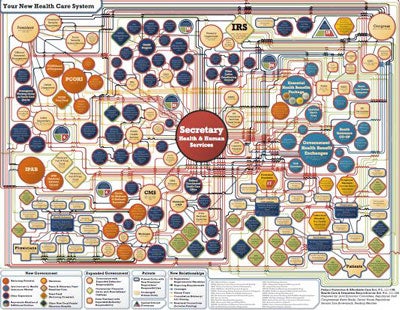Grace-Marie Turner, president of the Galen Institute, was among a number of experts who recently convened at The Heritage Foundation on a panel entitled “Beyond the Individual Mandate: Why Obamacare Must Be Repealed.” Turner is one of the authors of Why Obamacare Is Wrong for America, along with James Capretta, Thomas Miller, and Heritage expert Robert Moffit.
At the panel, Turner highlighted a number of the law’s problems, including its constitutionality. Never before has the federal government required individuals to purchase a product, which as she says in her book, “makes one wonder what else Congress can make Americans do if it makes us buy health insurance.”
The law’s mandate, she believes, also presents an economic problem. The legislation requires employers to provide insurance for employees or pay a penalty, forcing businesses to hire fewer employers, keep wages down, and reduce investments. As a result, business will suffer, which could translate into higher prices for consumers.
In the book, Turner and her co-authors also point out that Obamacare unnecessarily expands centralized power and bureaucracy in Washington to the detriment of Americans’ health care. At the panel, she presented the following chart from the Joint Economic Committee, which illustrates the massive complexity of just a portion of the law (the whole thing wouldn’t fit on one chart):
Turner discusses another example from the book, the Independent Payment Advisory Board (IPAB), which will enforce a new statutory limit on spending growth in Medicare without congressional approval. Because of restrictions in the law, the most likely tool IPAB will use is cutting reimbursements, which will reduce access to providers, creating waiting lines and indirectly rationing care for seniors—all due to the decisions of Washington bureaucrats.
Turner and her colleagues also stress the need to reform Medicaid, whose existing problems will only be exacerbated by Obamacare. Medicaid, she mentioned at the panel, is the “worst health care program in America,” yet will provide coverage for one in four Americans after Obamacare’s expansion of the program. Adding so many more people to a broken program will cripple state budgets. Furthermore, Medicaid often pays providers less than the cost of providing their services, making it difficult or impossible to keep their doors open to its enrollees. With more patients reliant on this program, more Americans will be exposed to its lower quality of care.
As authors of the book say, “The very real health care problems in the United States can be solved, but not with Obamacare. The key is to empower patients, not the government.” The only way to properly reform health care is to repeal Obamacare in its entirety and replace it with common-sense, market-oriented reforms that take power away from government bureaucrats and back into the hands of doctors and individuals.
To listen to the entire event, click here.
































5 Replies to “Turner Lays Out the Case Against Obamacare”